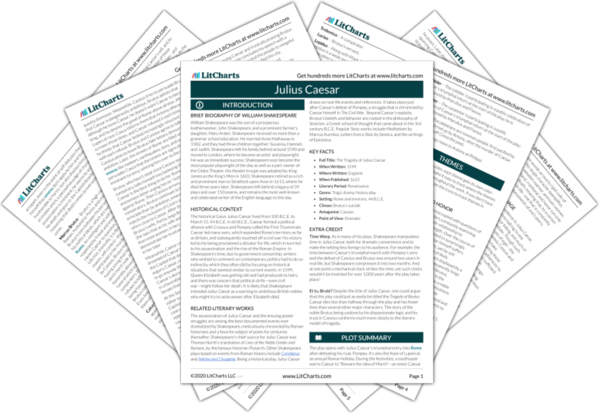Summary
Analysis
There’s thunder and lightning as Casca and Cicero enter. Casca is disturbed by the earth’s shaking and the fire dropping from the heavens. He speculates that it’s either civil war among the gods, or else humans have provoked the gods to destroy them. He also saw a slave’s hand burn unharmed, a lion strolling down the street, and an owl hooting at noon. Casca concludes that this collection of omens can be no natural coincidence. Cicero agrees that it’s all quite strange, but that people are prone to misconstrue signs.
The confluence of supernatural events foretells the historical significance of Caesar’s murder, and it also raises the question of fate’s role—do these omens predict inevitable events, or will the omens create an expectation of consequential events in people’s minds?
Themes
Literary Devices
Quiz
Test Yourself
Cicero exits, and Cassius comes to see Casca. Cassius says that he has been walking fearlessly through the stormy night, and that Casca wouldn’t be afraid, either, if he understood the meaning behind these “instruments of fear and warning”—namely, that there’s “a man no mightier than thyself or me […] yet prodigious grown.” Romans’ willingness to put up with such a man shows that they have grown “womanish.”
Cassius’s approach here is similar to his conversation with Brutus earlier—he doesn’t name Caesar directly, but insinuates that Caesar is a threat to Rome. He also categorizes strength and resistance to tyranny as inherently masculine traits and passivity as “womanish” or feminine.
Themes
Quiz
Test Yourself
Casca mentions the rumor that the Senators are going to crown Caesar as king tomorrow. Cassius says that, in that case, he will commit suicide sooner than submit to tyranny. He adds that maybe he shouldn’t speak like this in front of Casca, if Casca doesn’t mind such “bondage.” But Casca says that if there’s a faction that’s preparing to overthrow tyranny, he’s willing to follow them all the way. Then Cassius tells him about the conspiracy to assassinate Caesar.
Again, as he did with Brutus earlier, Cassius sounds out Casca’s leanings before telling him about the plot, casting Caesar as a tyrant and resistance to Caesar as a moral duty. Cassius is a master of manipulation.
Themes
Literary Devices
Quiz
Test Yourself
They’re interrupted by Cinna, a member of the conspiracy. Cassius gives Cinna some fake letters to leave where Brutus will find them. Then Cassius and Casca agree to confront Brutus at his house and win him over to the conspiracy, confident that he’s nearly persuaded already.
The conspirators move forward in their plans to trick Brutus over to their side. The element of trickery shows that they know their plans are dishonorable, yet winning Brutus’s honorable nature is vital to the success of their plot.
Themes
Quiz
Test Yourself
Get the entire Julius Caesar LitChart as a printable PDF.













